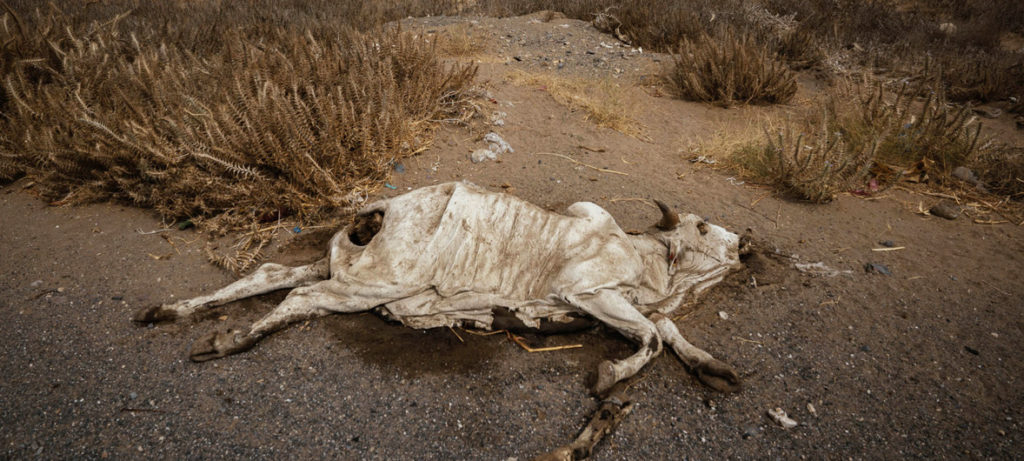Million across Yemen ‘just a Step Away from Famine’, with Food Available but Inaccessible
MIDDLE EAST AND NORTH AFRICA, UNITED NATIONS, 11 Feb 2019
UN News – TRANSCEND Media Service
While nearly 10 million people across Yemen remain “just a step away from famine”, the United Nations Emergency Relief Coordinator has spoken of his deep concern that a large food storage depot on the outskirts of the crucial port city of Hudaydah, has been out of bounds since last September.
7 Feb 2019 – “Enough grain to feed 3.7 million people for a month has sat unused and possibly spoiling in silos at the mills for more than four months”, said Mark Lowcock, in a statement on the depot, known as the Red Sea Mills. “No-one gains anything from this, but millions of starving people suffer”.
The World Food Programme (WFP) alone, has 51,000 metric tons of wheat stored there, a quarter of its in-country wheat stock and enough to feed 3.7 million people for a month. WFP has been unable to access the Mills since September 2018 because of fighting.
“These events are to be deplored.” —UN Humanitarian Coordinator
Last month two silos in the Government-controlled area were hit by mortar fire, probably destroying enough grain to feed hundreds of thousands of people for a month.
“These events are to be deplored” stressed Mr. Lowcock.

A dead cow lies beside the main road leading out of the port town of Al Hudaydah. Locals tend to avoid dead carcasses as some have been known to be filled with Improvised Explosive Devices (IED). OCHA/Giles Clarke
Access to the mills grows progressively more urgent as the longer they remain inaccessible, and the risk of grain spoilage is growing each day.
Citing security concerns, forces affiliated with the Houthi rebels, formally-known as Ansar Allah, have, to date, not allowed the UN to cross front lines to access the mills.
According to Mr. Lowcock, discussions continue with all parties. “I appreciate the genuine efforts that have been made on all sides to find a solution”, he said, “but it remains elusive”. He implored all parties “to finalize an agreement and facilitate access to the mills in the coming days”.
Meanwhile, the UN and its humanitarian partners are scaling up to reach 12 million people with emergency food assistance – a 50 per cent increase over 2018.
In December, the World Food Programme (WFP) reached a record 10 million people.
“We can save huge numbers of people, most of them in areas controlled by Ansar Allah” concluded Mr. Lowcock, “But we need more help to do that from the authorities who control these areas”.
Earlier this week, the Security Council stressed the “vital importance” of making progress towards a political agreement to end the conflict and “relieve the humanitarian suffering of the Yemeni people”.
‘Challenges remain’ implementing first steps of Stockholm peace deal
Meanwhile, in talks brokered by UN aimed at delivering the Hudaydah Agreement, which grew out of historic consultations between Government and Houthi leaders in Stockholm at the end of last year, challenges remain, the UN told correspondents in New York on Thursday.
The Redeployment Coordination Committee (RCC) met again, ending a session on Wednesday, which involves both sides, chaired by General Michael Lollesgaard, who is heading a team of UN observers and monitors, trying to negotiate the withdrawal of fighters from the Houthi-held port city, stabilize the fragile ceasefire, and open new humanitarian corridors.
“Nevertheless, challenges remain, not least the complex nature of the current frontlines,” said UN Spokesperson, Stephane Dujarric, adding that “to help overcome these issues, the RCC Chair tabled a proposal that proved acceptable, in principle, to both parties to move forward on the implementation of the Hudaydah Agreement. A preliminary compromise was agreed, pending further consultation by the parties with their respective leaders.”
He added that “both parties have given a firm commitment to observe and enhance the ceasefire in the interim”.
DISCLAIMER: The statements, views and opinions expressed in pieces republished here are solely those of the authors and do not necessarily represent those of TMS. In accordance with title 17 U.S.C. section 107, this material is distributed without profit to those who have expressed a prior interest in receiving the included information for research and educational purposes. TMS has no affiliation whatsoever with the originator of this article nor is TMS endorsed or sponsored by the originator. “GO TO ORIGINAL” links are provided as a convenience to our readers and allow for verification of authenticity. However, as originating pages are often updated by their originating host sites, the versions posted may not match the versions our readers view when clicking the “GO TO ORIGINAL” links. This site contains copyrighted material the use of which has not always been specifically authorized by the copyright owner. We are making such material available in our efforts to advance understanding of environmental, political, human rights, economic, democracy, scientific, and social justice issues, etc. We believe this constitutes a ‘fair use’ of any such copyrighted material as provided for in section 107 of the US Copyright Law. In accordance with Title 17 U.S.C. Section 107, the material on this site is distributed without profit to those who have expressed a prior interest in receiving the included information for research and educational purposes. For more information go to: http://www.law.cornell.edu/uscode/17/107.shtml. If you wish to use copyrighted material from this site for purposes of your own that go beyond ‘fair use’, you must obtain permission from the copyright owner.
Read more
Click here to go to the current weekly digest or pick another article:
MIDDLE EAST AND NORTH AFRICA:
- How Arab-Muslim Leaders Betrayed the People
- Thirty Years of Middle East Lies just Keep Coming Back to Haunt Us
- Israeli Atrocities Continue in Lebanon
UNITED NATIONS: